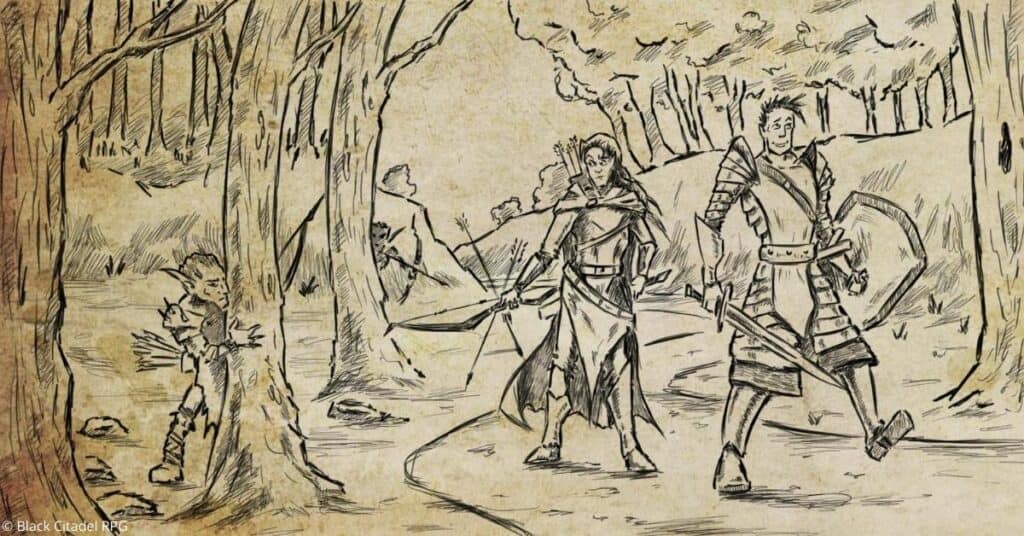Last Updated on August 23, 2023
Contrary to the beliefs of well-intentioned coworkers, friends, and relatives, no one actually likes a surprise party.

Likewise, one of the worst things in Dungeons & Dragons 5e is a surpris-ed party.
Yikes. Moving hastily on from what might be the worst intro I’ve ever written to a post on this site…
But seriously, if you’re sick of getting ambushed by goblins every time you take a short rest, having your day ruined by every hidden pit, arrow trap, and deadfall you stumble into, or missing vital clues that leave you standing in the dark scratching your collective heads, consider picking up the Observant feat.
With a great mixture of passive Perception and Investigation buffs, an ability score increase, and some nifty lip-reading, this is one of the best utility feats in 5e for players who want to find all the clues, dodge all the traps, and see the monsters coming before the monsters see them.
What’s a Feat?
Feats are an optional, criminally underused feature of D&D 5e.
Whenever your character has the option to take an Ability Score Increase, you can instead opt to choose from an extensive list of feats – special abilities, buffs, and tweaks that have the potential to completely rework the way you play your character.
(For a list of all the Feats in D&D 5e you can refer to our Feats List)
What Does the Observant Feat Do in DnD 5e?
Taking the Observant Feat in 5e gives a +1 to either Intelligence or Wisdom score, the ability to read lips, and +5 to passive perceptive and investigation scores. These abilities all give you a huge increase to your situational awareness of your surroundings and being prepared.
The Observant feat is easily one of the most useful feats in 5e, especially in campaigns that focus on investigating mysteries, crawling through dungeons, and exploring the wilderness.
It’s a great way to ensure you not only don’t get caught unawares by every wandering monster in search of a midnight snack but also don’t miss out on crucial information because you were too busy being swallowed by a gelatinous cube.
Observant
Quick to notice details of your environment, you gain the following benefits:
- Increase your Intelligence or Wisdom score by 1, to a maximum of 20.
- If you can see a creature’s mouth while it is speaking a language you understand, you can interpret what it’s saying by reading its lips.
- You have a +5 bonus to your passive Wisdom (Perception) and passive Intelligence (Investigation) scores.
Source: Player’s Handbook
Is the Observant Feat Good?
Short answer: yes, very.
The Observant feat manages something that not many feats pull off: a broad range of applications due to the feat’s combination of a flat bonus with strong situational abilities.
First, you get a nice buff to either your Intelligence or Wisdom.
In most cases, picking up a feat means sacrificing a chance to boost your stats; either bumping one stat up to the next even number, which grants a coveted +1 bonus to your modifier in that ability, or allowing you to increase two scores by 1, which is great for rounding out your character and can potentially get you a modifier increase in two stats.
By giving you a +1 bonus to one ability score, Observant softens the opportunity cost of picking a feat over an ASI, which is great.
Next, you gain the ability to lip-read. While this doesn’t have an explicit mechanical benefit, the potential applications for scouting, spying, and scoping out your enemies’ plans are virtually limitless.
Whether you’re spotting cultists across a crowded masquerade ball or trying to figure out when the next goblin patrol will leave its isolated mountain cave, lip-reading is a super useful tool to have in a character’s back pocket when trying to get one over on your opponents.
Lastly, we have the massive +5 bonus to passive Perception and Investigation scores, which are probably the reason most people pick up this feat.
Gather Information
At the risk of getting a little Sun Tzu for a minute here, in my opinion, the difference between a successful adventurer and a dragon’s main course is how well that adventurer gathers information.
Players have imperfect knowledge of the game world and, outside of their character sheets and maybe a handout, only have the DM as a window through which to view that world.
DMs are, by and large, happier to dispense information than players think. At least, I am.
Whether they’re asking detailed questions about the history of my setting (lore dumps are only cool when they’re consensual, guys) or asking me to describe a mundane corner of a dungeon in detail because they’re like 100% sure it’s trapped, the fact the players are trying to accumulate as much information as possible is never a bad thing.
Most information is freely available to players who ask pertinent questions. I always try to encourage new players to cover the five senses when they explore a new area.
I might describe two or three, but any player who follows up my description of a cave with “what does it smell like in here? Can I detect anything that might suggest something is living in here?” is definitely going to get some free intel along the lines of:
“You take a deep sniff, detecting the sour smell of sweat mixed with animal musk. Also, from the far end of the cave you detect a faint whiff of woodsmoke and charred meat. A cooking fire.”
Obviously, if they’d just walked to the back of the cave, I would have described the smell of the goblins holding an impromptu luau over the smoldering remains of the last adventuring party who stumbled blindly into their lair.
But by that point, the party would be close enough to the goblins to warrant Perception and Stealth checks, with the potential for things to get real messy, real fast – like every good luau.
By asking specific information, the players are telling me, the DM, what they’re paying attention to.
We’ve all walked through a room, blindly focused on our own thoughts, and missed something really obvious (goblins in grass skirts dancing around a human spit roast might be an extreme example, but what do I know?
I wasn’t paying attention), so telling me that they want to hone in on a particular sensation is, as far as I’m concerned, the key to some extra details.
Basically, I want to encourage players to ask the right questions, rather than roll the “right number” on a d20.

Top tip for players: Ask more questions.
Top tip for DMs: Answer them.
Of course, some information isn’t readily available.
Whether it’s spotting a goblin ambush, interpreting a set of ancient runes, or something else, there are plenty of situations where the players need to rely on more than their five senses.
This is where either the dice come into play (investigating an area for hidden doors, making a Perception check for traps, etc.) or the players need to do something to try and get that information without rolling, like tapping sections of stone with a hammer and listening for hollow sounds or getting one of your retainers to poke the glowing orb to see what it does.
This is the sort of stuff I always try to encourage, as picking up the dice at my table is to invite failure and therefore consequences.
All the player canniness and +7 Perception checks in Faerun aren’t enough to change the fact that sometimes players just roll like crap, however.
Usually, when this happens, unpleasantness follows – like a surprise birthday party attended by all your most-quirky elderly relatives.
Likewise, when you’re a DM, asking players for a Perception check can – if they fail – tip off those players that there’s a piece of important content that they’ve missed.
If they’re good sports, they’ll just continue doing what they were doing; their characters will be none the wiser, but the players are going to be frustrated.
While I enjoy player frustration when it’s merited (as the result of a particularly ill-conceived plan, for example), watching my players get frustrated because they feel like an arbitrary dice roll just screwed them out of the next step in the adventure is no fun at all for anyone.
Thankfully, this is what passive Perception and Investigation are for – and why the Observant feat is such a gift to DMs, not to mention a potential lifesaver for the players’ characters.
A (Quick) Guide to Passive Perception and Investigation

Passive Perception and passive Investigation are statistics every character in D&D 5e has.
They take your Wisdom and Intelligence modifiers, respectively, and add 10 to create a static number that determines how aware a character is of their surroundings.
This means that, instead of calling for a Perception or Investigation check, the DM can just compare, for example, the result of a monster’s Stealth check to the party’s passive Perception scores to determine whether they’re surprised or not.
This can also be used to determine whether players spot traps, notice clues, and otherwise gain information from their environments when the result of calling for a check might create dissonance between player and character knowledge should they fail.
Scott wrote a great guide to passive Perception, which you can read here. I highly recommend it if you still feel like your grip on the concept is a little fuzzy. It definitely helped me out, so thanks, Scott!
The Observant feat gives you a whopping +5 bonus to both your passive Perception and Investigation, meaning your character is way more likely to just unlock pieces of useful information by just walking through a room.
Want to feel like Sherlock (one of the good ones, from the Guy Richie films or Elementary, not Stephen Moffat’s raging dumpster fire of smugness – don’t @ me) as you soak up and sort through useful clues to pull a super gratifying conclusion seemingly out of thin air?

How about a scholar of arcane languages? Or Mulder from The X-Files? The Observant feat is going to get you a hell of a lot closer to that fantasy.
Which Classes Synergize Best With the Observant Feat?
Best results with the Observant feat rely somewhat on you having a not-totally-garbage Wisdom and/or Intelligence score to begin with.
Not to mention the +1 bonus to Wisdom or Intelligence is going to feel wasted on some of classes that favor a more, ahem, direct approach to problem solving.

Therefore, pretty much any Wisdom- or Intelligence-based class is going to be a solid candidate for the Observant feat, although other subclasses that use Intelligence or Wisdom as secondary stats (or have some pretty synergistic abilities) are a good fit here as well.
Ranger
Masters and mistresses of the wilderness, rangers excel at exploring unmapped terrain and tracking their enemies and are usually relied upon by parties to be the one who can consistently roll above a 15 when making checks to not to get jumped by wandering monsters.
The Observant feat just cranks all this up to 11. It’s basically a way to tell your DM, “No, thank you, I won’t be dealing with any traps this campaign.”
Rangers also use Wisdom to power their (admittedly limited) spellcasting, so putting an extra point into this ability score won’t feel like a waste.
Druid
With Wisdom as a primary ability, druids make prime candidates for the Observant feat. The fact that you can read lips also persists while you’re in your wild shape.
Simply transform into something with insanely good eyesight, park yourself up the nearest tree (or flying 200 feet above the enemy fortress as a falcon), and return to the party 20 minutes later with a full report on the BBEG’s evil plan.
Wizard/Artificer
Druids and rangers work with the Observant feat thanks largely to their emphasis on a high Wisdom score.
If you want to put more emphasis on a highly analytical problem-solver-type character, putting the Observant feat on a Wizard or Artificer is going to be a blast.
Solve magical puzzles and decode mysterious runes at the drop of a hat, and an extra point in your spellcasting modifier doesn’t hurt either.
The City Watch/Investigator Background
If you’re looking to build a character from 1st level around the Observant feat (using either a variant human or the custom lineages from Tasha’s Cauldron of Everything), then the City Watch/Investigator background is a great place to start.
You get proficiency in Investigation – which is good because classes and races more commonly give the option to be proficient in Perception – as well as a knack for finding local guard posts and dens of criminal activity.
Perfect for a detective that solves cases by walking on both sides of the law.
The Keen Mind Feat
In addition to another juicy little +1 bonus to your Intelligence, the Keen Mind feat gives you some great utility options that synergize beautifully with Observant.
You can always get your bearings, always know how many hours it is until sundown, and have a month-long photographic memory – perfect for combining with Observant; the more you see, the more you remember.
If you’re looking for other Feats, try these two:
Mounted Combatant Feat 5e
Polearm Master Feat 5e
I played my first tabletop RPG (Pathfinder 1e, specifically) in college. I rocked up late to the first session with an unread rulebook and a human bard called Nick Jugger. It was a rocky start but I had a blast and now, the better part of a decade later, I play, write, and write about tabletop RPGs (mostly 5e, but also PBtA, Forged in the Dark and OSR) games for a living, which is wild.
